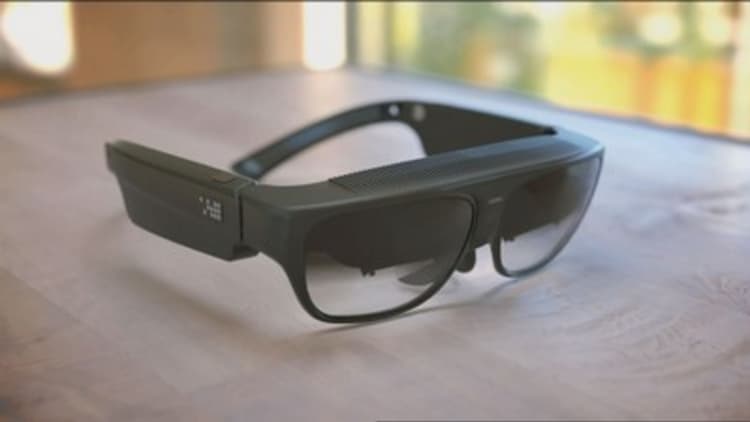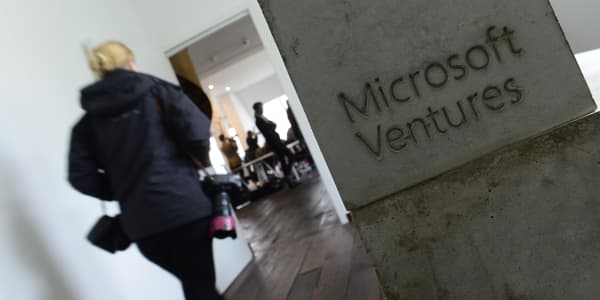
The Osterhout Design Group is betting it can make a set of augmented reality glasses that can succeed where competitors have so far failed — getting lots of people to actually wear them.
Unlike Google — which offered the first set of consumer smart glasses n May 2014 for $1,500 — ODG is marketing its product first to enterprise customers, with plans to offer a sleek consumer version down the line.
The company is now shipping its latest pair of smart glasses — the seventh iteration of the product, called R-7 — to customers in fields as varied as automotive, medical and entertainment. Price: $2,750.
Examples: ODG partnered with BMW to deliver navigation and safety information to drivers via the R-7; Stanford orthopedic surgeons use the glasses to examine X-rays from multiple angles and to look right into patients' bones; and the company is in talks with airlines about broadcasting in-flight 3-D movies on the glasses — first class only, for now.
The ultimate goal is to take the product mainstream. OGD VP Nima Shams sees a future in which tablets and smartphones are replaced by smart helmets, goggles and eventually fashionable sunglasses.
Shams describes the R-7 as a high-end mobile head-worn computer. The device projects a virtual display that appears to float just inches from the wearers' eyes. The experience is like looking at a 65-inch screen 8 feet away. Importantly, the display is see-through, so users can maintain awareness of their surroundings.
"The use cases of AR are massive and they can be used in all aspects of life," said Shams. "So, if you're commuting, you can do private email or banking or watch a movie on the screen."
The technology may look clunky, but it will be refined, said Piper Jaffray analyst Gene Munster. "It's a paradigm shift, and they are right there at the forefront of it."
A recent Goldman Sachs report said virtual reality and augmented reality have the potential to be as groundbreaking as PCs and smartphones once were.
In the future, digital information will overlay everything, and that's what makes augmented reality such a massive market, said Shams.
"Virtual reality transports you into the digital world and makes you lost in your surroundings. However, augmented reality brings the digital world to your reality. It super-positions information technology on everything you see," he said.
Founded in 1999 by CEO Ralph Osterhout, ODG recently announced an agreement for 21st Century Fox to acquire a minority stake. The attraction for ODG, which had been entirely privately held, is access to a library of content — from "The Simpsons" to National Geographic.
"The hardware is the barrier to entry, but it's the software and the content that makes it magical," said Shams.
The opportunity to develop the hardware — and dominate the next computing platform — is attracting attention from public and private companies.
Goldman Sachs estimates that venture capitalists have invested $3.5 billion in 225 virtual- and augmented-reality deals over the past two years. (Facebook notably acquired VR company Oculus for $2 billion in May 2014.)
Goldman lists the ODG alongside Microsoft HoloLens, Google Glass, Magic Leap and Atheer as key players in the industry.
Read More Virtual reality for gaming & beyond
In the past year there's been a lot of activity. Apple acquired augmented reality and computer vision company metaio (the terms were not disclosed, but Pitchbook pegs it at $32 million), and Intel bought smart eyewear company Recon. Google continued its multipronged approach of revamping its consumer product Google Glass, working with enterprise customers to develop Glass at Work and investing heavily in the ecosystem.
Google was also the lead investor in start-up Magic Leap's 2014 Series B funding round, which attracted an all-star list of backers including Andreessen Horowitz, Kleiner Perkins, Legendary Entertainment and Qualcomm Ventures. The company raised $827 million, giving it a post-money valuation of near $4.3 billion, according to Pitchbook. To put that in perspective, that's more than double what Facebook paid for VR headset maker Oculus that same month.
Munster described Magic Leap as the company with the most hotly anticipated consumer mixed reality product. "They could have the solution that Google ultimately acquires," he said.





